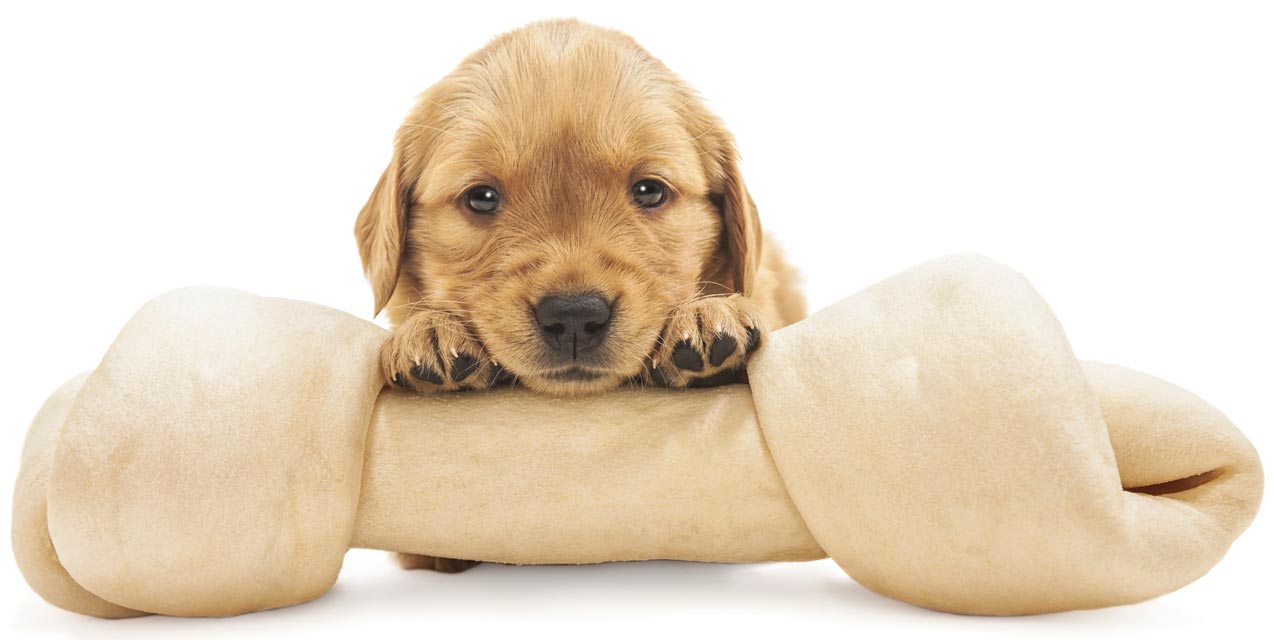Are Rawhides OK for Dogs?

Rawhides are a popular thing that people like to give their dogs for treats or, sometimes, to keep them busy while the owner does other things. But rawhides can be dangerous, so it's essential that you follow certain guidelines if you give them to your dog.
What Is Rawhide?
Rawhide is made from dried animal skins. The skins come from leftovers from the leather industry and are treated in salt brines and lime before being pressed into rawhide treats.
Tips for Giving a Dog Rawhides
When considering rawhides for your dog, keep the following rules in mind:
- Choose rawhides that are made in the USA. There have been many problems with rawhides made elsewhere containing dangerous bacteria that have sickened dogs. It's safer to choose American made rawhides.
- Use plain rawhides instead of flavored ones. Flavorings on rawhides can cause severe GI distress in dogs. In fact, meat-based flavorings can result in pancreatitis in dogs that are sensitive. It's best to stick with plain rawhides.
- Don't let your dog chew rawhides unsupervised. Rawhides can be choking hazards because, as a dog works on a chunk and it comes loose, they can swallow it and choke. Additionally, rawhide isn't particularly digestible, so fragments can cause gastrointestinal blockage of the stomach or small intestine.
- Remove soft hunks of rawhide that come off. Monitor a dog's rawhide chewing at all times, and remove any pieces that come loose before your dog can swallow them.
- Choose an appropriate size for your dog. Choosing an appropriately sized rawhide can help deter problems caused by the dog getting chunks off and swallowing them. A small rawhide may be more dangerous to a large dog than a bigger one.
-
Don't give rawhides to voracious chewers. Some dogs are delicate chewers that take their time and get only tiny, soft pieces of the rawhide off occasionally. Others are voracious chewers that attack a chew treat with vigor, tearing off dangerous chunks with abandon. If your dog is in the latter category, rawhides are probably not right for them.
- Limit rawhide-chewing time. It's best to use rawhides as an occasional treat rather than having them available all the time.
- Don't give rawhides to dogs with tooth problems. Rawhide chewing can further damage loose or broken teeth, so dogs that already have dental issues shouldn't chew rawhides.
- Encourage extra water consumption on rawhide chewing days. It's a good idea to encourage your dog to drink excess water on days that they get a rawhide.
- Avoid pigs' ears, cows' hooves, and anything with meat juices added. Those treats are common triggers of pancreatitis in dogs.
Rawhide Alternatives
There are lots of alternative treats and chew toys to rawhide. Nylon chew toys can be useful for avid chewers and are safer if you choose the right size.
Toys that you can stuff with treats or peanut butter can be good alternatives for dogs that like to have a taste of something when they chew.
You May Also Like These Articles:
Fruits and Vegetables Safe for Dogs
Quiz - Do You Know Which Human Foods Are Toxic to Dogs?
Toxicity of Raisins and Grapes in Dogs
Disclaimer: This website is not intended to replace professional consultation, diagnosis, or treatment by a licensed veterinarian. If you require any veterinary related advice, contact your veterinarian promptly. Information at DogHealth.com is exclusively of a general reference nature. Do not disregard veterinary advice or delay treatment as a result of accessing information at this site. Just Answer is an external service not affiliated with DogHealth.com.
Notice: Ask-a-Vet is an affiliated service for those who wish to speak with a veterinary professional about their pet's specific condition. Initially, a bot will ask questions to determine the general nature of your concern. Then, you will be transferred to a human. There is a charge for the service if you choose to connect to a veterinarian. Ask-a-Vet is not manned by the staff or owners of DogHealth.com, and the advice given should not delay or replace a visit to your veterinarian.



